The callousness with which these political dissidents are being treated goes against the Supreme Court's directive, given right at the beginning of the lockdown.
The apex court had directed states to release prisoners to decongest jails, which had become hotspots of the coronavirus.
Jyoti Punwani reports.
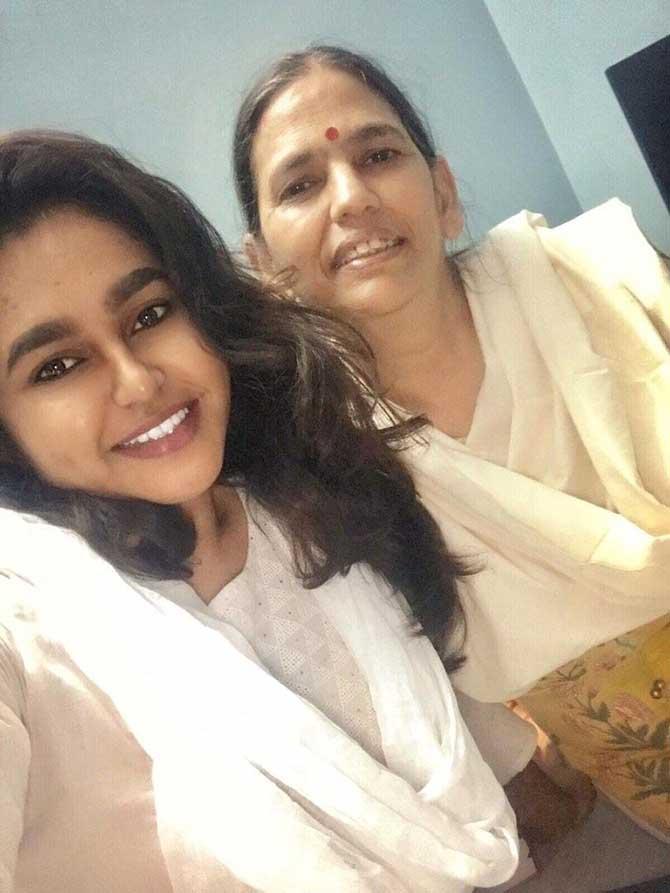
The last few days have shown that the Right to Health, defined by the Supreme Court in more than one judgment as an integral part of the Right to Life, is being denied to the jailed intellectuals awaiting trial in the Bhima Koregaon case.
While poet Varavara Rao was stealthily shifted from the Nanavati Hospital in north west Mumbai back to the Taloja Jail a few days before his scheduled bail hearing (to be held on August 31, now deferred to September 3), advocate Sudha Bharadwaj's latest medical report had mysterious omissions.
Bharadwaj applied for bail on health grounds on June 10.
Her petition pointed out that her co morbidities: A history of pulmonary TB, and her ongoing diabetes and hypertension, made her more vulnerable to COVID-19.
On July 21, the Byculla Jail reported that the 58 year old had ischemic heart disease, and confirmed that she had a history of pulmonary TB, diabetes and hypertension. The report also said that she had osteoarthritis.
The latest report dated August 21, does not mention ischemic heart disease or osteoarthritis.
Curiously, however, the tablet 'atorvastain' (sic) is mentioned in the list of drugs that Bharadwaj is being administered.
This was the very drug that was prescribed to her for her ischemic heart disease, according to the earlier medical report. Only there it was spelt correctly as 'atorvastatin', and its strength was also given.
The drug is prescribed to prevent heart disease, including heart attacks and strokes.
What does one conclude from this? Why did the latest medical report omit the name of the disease for which Bharadwaj is taking medicine prescribed by the jail doctor?
Again, the latest report does not mention osteoarthritis, but talks of 'bodyache'.
The first report stated that while the Byculla Jail's capacity was 262, it housed 266 inmates. This precluded any possibility for social distancing as required for preventing COVID-19.
The second report states that the jail now has 246 inmates, hence it is not overcrowded.
Does the reduction of its strength by 20 inmates allow the kind of social distancing required?
"The second report appears to be fictitious as there is a vast divergence between the two reports," says Bharadwaj's lawyer Ragini Ahuja.
However, stating that there is no inconsistency in the reports, and accepting the public prosecutor's contention that whenever further treatment is required, it would be provided, the high court denied bail to Bharadwaj on health grounds.
Two curious factors emerged in this hearing.
First, the public prosecutor, appointed by the Maharashtra government, echoed what the additional solicitor general for the National Investigation Agency said.
The Maharashtra government, specially its senior-most leader Sharad Pawar, had initially criticised the way the Bhima Koregaon case investigations were going, the way the original two Hindutva activists accused for the violence, Sambhaji Bhide and Milind Ekbote, were being ignored.
The government had resisted its takeover by the NIA, and Pawar had declared that an SIT would be set up to conduct a parallel investigation.
Now, the Maharashtra government speaks in the same voice as the NIA.
Secondly, the NIA ASG, without a trace of irony, gave the precedent of Varavara Rao being admitted to Nanavati Hospital to reassure the court that if the need ever arose, Sudha Bharadwaj too would get the best care.
But Rao was only admitted to Nanavati after a public outcry and the National Human Rights Commission sending a notice to the Maharashtra government.
Left to itself, the NIA would have let Rao rot in Taloja Jail hospital, where it has hurriedly deposited him again even while he was under treatment at Nanavati Hospital.
***

The NIA's intentions become clear when you consider that even in as basic a matter as a COVID-19 test, accused Vernon Gonsalves, Anand Teltumde and Mahesh Raut, have had to petition the court.
Gonsalves, aged 61, was deputed by Taloja Jail to look after Professor Varavara Rao in the jail hospital. Teltumde, aged 70, was afraid he may have contracted Covid since he was in contact with Professor Rao; while Raut, aged 33, had symptoms of the virus.
Their plea was made in mid-July; it was only on August 28 that their reports were submitted.
In the interim, the Taloja Jail had submitted two medical reports, supposedly of Teltumde and Raut, but completely identical. Later, they submitted revised reports, saying the earlier reports were due to a 'copy paste mistake'.
One of Sudha Bharadwaj's medical reports too had to be rejected by the court because it was unintelligible.
Such is the casual attitude of the jail authorities towards the health of these undertrials. And nobody's holding them accountable.
On the other hand, the additional solicitor general of the NIA's presence at these hearings, shows how important this case is for the Centre.
***
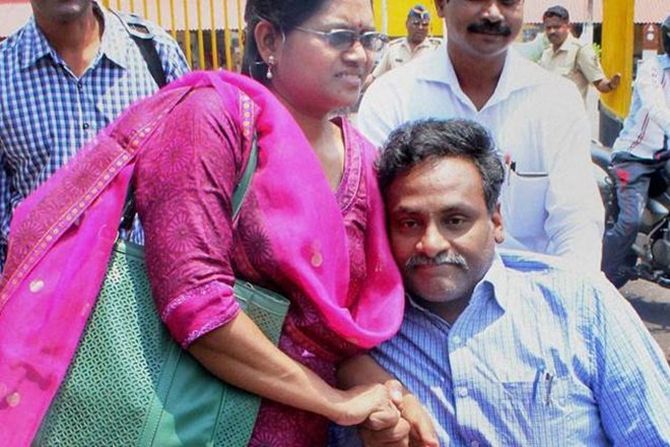
The treatment of these prisoners who have yet to be tried, has brought home what was clear from the beginning of the lockdown: The spread of COVID-19 is being used to full advantage by the State to deprive citizens of their Fundamental Rights.
In a matter as crucial as health, these hearings have dragged on for more than a month (in Bharadwaj's case, more than two months), with families of the accused kept totally in the dark. It is only through the court that they have been informed of the health of their loved ones.
Perhaps the worst example of this deprivation of human rights is the refusal of any kind of bail or even parole to the 90 % physically disabled Delhi University Professor G N Saibaba.
His last bail appeal was rejected on July 28. His mother passed away on August 1, pining to see her eldest son who she hadn't seen for the last four years.
Refusing to allow him to attend his mother's last rites, Jail Superintendent Anup Kumar Kumre gave this absurd explanation: 'He is a different kind of inmate. Some inmates don't return after being released on parole or furlough. If he had been earlier released on parole or furlough and had returned in due course, we might have thought of releasing him this time.'
This is a man unable to go to the toilet on his own, with no attendants provided to him, suffering from a range of crippling ailments which the Nagpur Jail Hospital cannot handle.
200 prisoners and 60 staffers of Nagpur Jail have tested positive for COVID-19.
Yet, the court has repeatedly chosen to accept the public prosecutor's assertion that the jail is looking after Professor Sai Baba and he was unlikely to contract covid in his high security cell where inmates cannot interact with one another.
The crime for which this professor has been convicted? Being a member of a banned organisation.
The callousness with which these political dissidents are being treated goes against the Supreme Court's directive, given right at the beginning of the lockdown. The apex court had directed states to release prisoners to decongest jails, which had become hotspots of the coronavirus.
According to Human Rights Watch, India, the world's largest democracy, compares with Bangladesh, Republic of Congo and Nigeria, in its refusal to decongest prisons in the wake of COVID-19.
Quite an achievement.
Feature Presentation: Aslam Hunani/Rediff.com
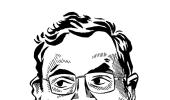
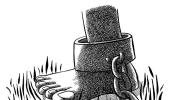

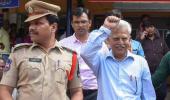




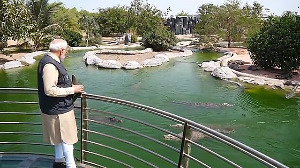

 © 2025
© 2025